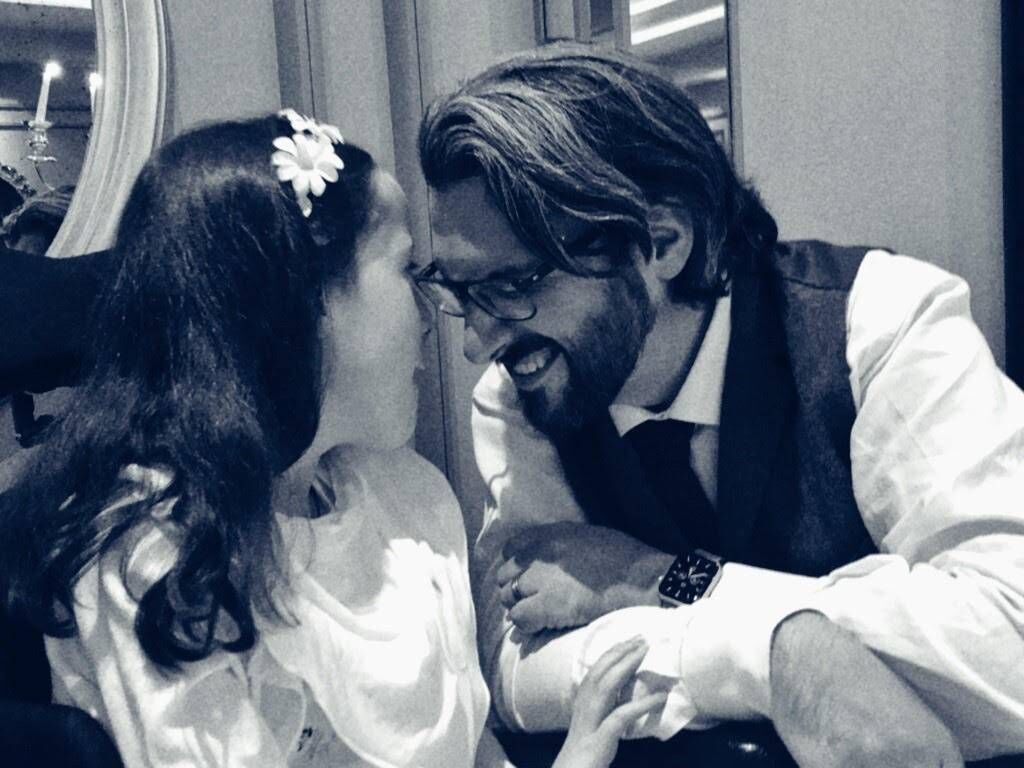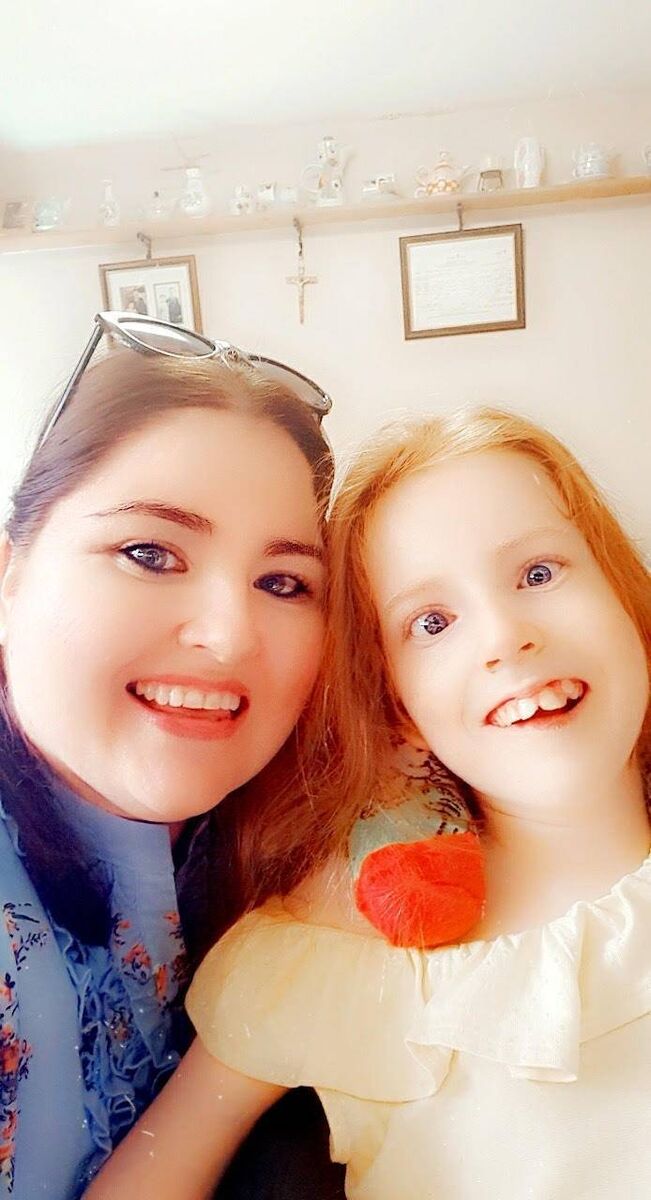'Our children can't vote': Parents fear children with special needs won't recover skills lost while out of school

Angelina Hynes and her daughter Zoe: 'I can't put into words the detrimental impact this is having on our kids.'
Partial reopening of special schools on February will see a maximum number of 50% of students attending on alternate days, something parents of those with the most profound disabilities say does not go far enough, writes .
The impact of school closures has meant parents of special needs children fear their children have regressed to such a point that they may not regain the skills they previously had.
Special schools are expected to partially reopen on February 11, and special classes in mainstream schools will return on February 22 after an agreement was reached between unions and the Department of Education. That was amid an ongoing row over concerns for teacher and SNA safety as Covid-19 continues to spread in the community.
There are 124 special schools with about 8,224 students in Ireland and 680 special classes in primary schools with about 7,520 students. In addition, there are about 7,500 children who can be considered to have the most severe levels of special educational needs in mainstream classes at primary level.
The partial reopening of special schools will see a maximum number of 50% of students attending on alternate days, something the parents of those with the most profound disabilities say does not go far enough.
Rosedale School in Galway provides an educational service for students aged six to 18 years with severe and profound learning disabilities. Families there say it "sticks in the throat" that the unions and Government didn't engage with families, who feel they were "completely left out of the decision-making process."
Many of the parents of the Rosedale Parents Association are reporting children not sleeping, behaviour deterioration and regression.
One mother involved with the school has reported suffering a concussion as a result of her teenage son's behavioural issues, while other children have displayed other worrying behaviours, including lashing out and anxiety, while a lack of other healthcare services such as dieticians, which are usually linked to the child's school, has caused further strain, including that some children have grown out of their wheelchairs.
They are calling for a full return to their children's classrooms, for routine and structure and a sense of stability and predictability.
The Department of Education says the decision to return on a 50% basis was made with unions and parents.
"The return to in-class teaching for all students with additional needs remains a priority for Ministers Foley and Madigan," a spokesman said.
"At all times the children, their families and carers were at the centre of every negotiation and discussion with the partners in education around the opening of special schools on February 11.
"The ministers have met on several occasions with organisations representing parents of children with additional needs."
The spokesman said meetings have also been held with the National Association of Boards of Management in Special Education, AsIAm, Down Syndrome Ireland, Inclusion Ireland, Family Carers Ireland and the Ombudsman for Children, among others.
Angelina Hynes, whose nine-year-old daughter, Zoe, has Pitt-Hopkins Syndrome, which leaves her with a severe intellectual disability, says she cries herself to sleep at night because she is so miserable out of school.
"I can't put into words the detrimental impact this is having on our kids," she said.
"She's bereft, she's grieving, she whines all-day – school is her everything, it's her independence.
"As parents, we're upset, kids with disabilities have been forgotten about, a part-time service won't work for us. It's crazy what the people think our children can do."
She said it took a few years to acclimatise Zoe to her school, to get her to sit in a room and tolerate other kids.
"That took years, and now she doesn't seem to think she'll ever get back," Ms Hynes said.
"She has lost the ability to feed herself with a spoon, now she's refusing to hold a spoon, maybe she can't remember, we don't know."
Ms Hynes said Zoe was "born anxious", with huge sensory needs, and had learned to deal with sounds and had even gone swimming with school.
When Angelina and her husband attempted to homeschool Zoe at the beginning of lockdown, she attempted to throw herself off a bench to the floor.
The Rosedale Parents Association spoke with Education Minister Norma Foley on January 14, when she said she was hopeful special schools would return.
"We feel like we've had the rug pulled out from under us," Ms Hynes said.
"People don't get it until it happens to you, we're the tip of the iceberg of this level of disability, so we're always the forgotten ones, our children are voiceless."
She said she doesn't want an apology in 20 years time saying her daughter was failed.
"You can't help being cynical when you're upset, our children can't vote," she said.
"People say vile things like they don't contribute to society, but my daughter has taught me more about love than anyone else. People need to open their hearts, these kids cannot be left behind because they may never regain their skills."
David Finnegan's daughter, Ava is 10 years' old with a very rare condition called Pura Syndrome, a complex neurological disorder affecting muscle control and development.

In addition to this condition, she also suffers from epilepsy, severe scoliosis, along with other issues associated with children with mobility disabilities.
"The reality of these disabilities is that Ava requires full-time care for all her needs," he said.
"None of the families will refuse the part-time help because we're so desperate, and aside from the anxiety it's causing in them, the kids are missing things like physio, occupational therapy services, speech and language. It's a sticking plaster on a wound, we're heartbroken with what we've been given," Mr Finnegan said.
"Between now and March when the schools fully open up, she might get two days a week.
"Children and young adults throughout Ireland went back to their new normal on January 11, adapting and moving on, while our most vulnerable children in the education system have been left waiting, hoping and wondering why no one has thought about their needs."
He said he has a little girl who misses her friends. They have lost all their support in lockdown.
"It's really isolating for her, it's like putting these kids in a dark box and not telling them why they're there.
"In our hospitals, patients are being assessed and treated based on those who require the most care. The reverse has happened in the Department of Education.
He said the loss of her most basic right to schooling is the most intolerable cruelty his daughter has had to face.
"This horrible virus has been in our lives for over a year, yet, there still hasn’t been any provision for the most vulnerable children.
"Our children’s disabilities worsen with every day that they are left waiting. To offer my daughter 50% education shows once again the lack of understanding of these stakeholders.
"Unfortunately Ava's disabilities aren't part-time too.
"The whole disability service has been painted with one brush. We're so specialised – these are children with profound disabilities, with a very poor standard of life. Parents know better how to care for those kids and we're completely ignored in this process."
Breffni Kilgannon's daughter Aine is 14 and has spastic quadriplegia, the most severe form of spastic cerebral palsy, due to a brain injury she sustained as a premature baby.
"Aine is non-verbal, so she speaks with her eyes and expression but she's gone into herself in the last few weeks," Ms Kilgannon said.
"I hadn't even thought about regression until then and what's more worrying for me is now she won't sleep in her bed on her own, she wants to sleep in my bed.

"She clings to my arm, and wraps her arm around mine and cries if I get up for the toilet or to leave.
"My main concern is school is her life, apart from me and her dad, when she can't see her other family in lockdown, she doesn't see friends, she sees other children playing, but it's not like that for her."
All of Aine's healthcare services are linked to her school, such as physio and occupational therapy, Aine's wheelchair is now too small for her, but because she has not been at school, she is not being reviewed as often.
"They're missing out on so much, it's not for education alone, it's a hub for all their services, everything they get, down to their paediatrician is through school, dietician, dentist, everything," she added.
"Aine's blind in one eye, so I can't leave her in front of the TV, so her world is smaller because of those things and to take school out of it, her world is so small now.
"She had such exposure to different people and environments, she's going back into herself and I'm wondering how are we going to integrate her out in society again, she'll be petrified."
Ms Kilgannon said she has been disappointed about how the State has dealt with provision for special needs children.
"I always thought Ireland was progressive on acceptance of special needs but in the past year I've seen a different side to this country and it's worrying, to be honest, we've gone to the bottom of the pile, those who need the most care and attention are not getting it, nobody listens to us."





